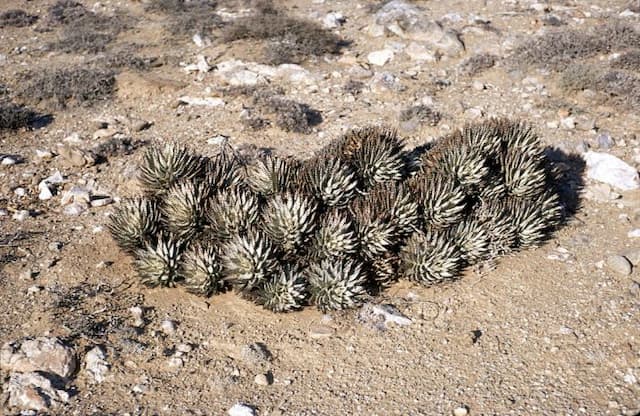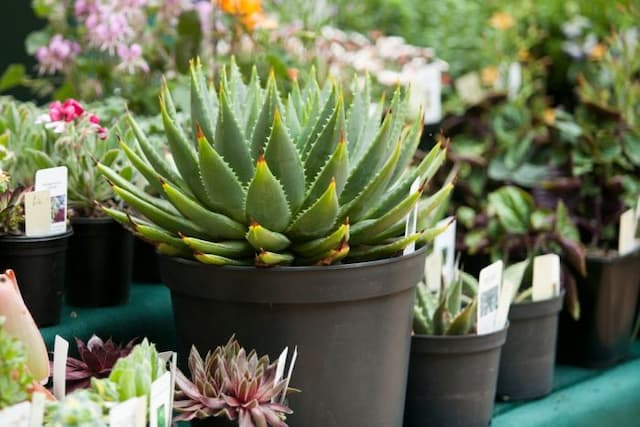Red Hot Poker Kniphofia 'Nobilis'

ABOUT
Kniphofia 'Nobilis', often referred to as Red Hot Poker, stands out with its striking, torch-like flower spikes. These bloom clusters range from rich orange-red at the top, transitioning down to a yellowish base, creating a fiery gradient reminiscent of a glowing ember. The flowers are tubular and densely packed, attracting hummingbirds, bees, and other pollinators. The foliage consists of arching, grass-like leaves that are a vibrant green. These leaves form a clump from which the impressive flower spikes emerge. The overall aspect of this Red Hot Poker variety conveys a tropical and exotic flair that adds a splash of bold color and vertical interest to any garden space where it is grown.
About this plant
 Names
NamesFamily
Asphodelaceae
Synonyms
Red Hot Poker, Torch Lily, Tritoma
Common names
Kniphofia 'Nobilis'.
 Characteristics
CharacteristicsLife cycle
Perennials
Foliage type
Evergreen
Color of leaves
Green
Flower color
Orange
Height
4-6 feet (1.2-1.8 meters)
Spread
2-3 feet (0.6-0.9 meters)
Plant type
Herb
Hardiness zones
6-9
Native area
South Africa
Benefits
 General Benefits
General Benefits- Attracts pollinators: Kniphofia 'Nobilis', commonly known as Red Hot Poker, attracts bees and butterflies, enhancing pollination in the garden.
- Drought tolerant: Once established, this plant is tolerant of dry conditions, making it suitable for water-wise gardens.
- Visual interest: With its striking, torch-like flowers, it provides a bold visual impact and adds height to garden borders.
- Low maintenance: Red Hot Poker is easy to grow and requires minimal care once established, making it ideal for busy or novice gardeners.
- Deer resistant: The plants are not favored by deer, which can help to prevent damage to your garden.
- Long blooming period: The plant has a long flowering season, which ensures colorful display in the garden for an extended time.
 Medical Properties
Medical PropertiesThis plant is not used for medical purposes.
 Air-purifying Qualities
Air-purifying QualitiesThis plant is not specifically known for air purifying qualities.
 Other Uses
Other Uses- The tall, striking flowers of Red Hot Poker are used to create visually arresting dried flower arrangements, adding texture and color to interior designs.
- Due to its nectar-rich flowers, Red Hot Poker can be planted to attract and support beneficial pollinators like bees and hummingbirds in garden ecosystems.
- Some gardeners use the Red Hot Poker plant as part of a companion planting scheme to enhance the growth of vegetables by attracting pollinators and beneficial insects.
- Red Hot Poker foliage can be included in a garden compost pile to add green matter, which helps to balance the carbon-nitrogen ratio and improve compost quality.
- The bold and bright blooms of Red Hot Poker plants are sometimes used in educational botanical displays to demonstrate the diversity of flowering plant forms.
- These plants are also employed as a natural border or barrier in gardens due to their height and density when planted in clusters.
- In landscape design, Red Hot Pokers are incorporated into fire-themed garden concepts for their flame-like flower spikes.
- Red Hot Poker plants can be used as a tool in sensory gardens due to their unique texture and vibrant colors, which engage visual and tactile senses.
- The robust root system of Red Hot Poker can help in soil stabilization, particularly on slopes or areas prone to erosion.
- Horticultural therapy programs utilize Red Hot Poker plants to stimulate participants' sense of accomplishment through the successful cultivation of visually striking plants.
Interesting Facts
 Feng Shui
Feng ShuiThe Red Hot Poker is not used in Feng Shui practice.
 Zodiac Sign Compitability
Zodiac Sign CompitabilityThe Red Hot Poker is not used in astrology practice.
 Plant Symbolism
Plant Symbolism- Stand Out in the Crowd: Kniphofia 'Nobilis', commonly known as Red Hot Poker, features vibrant and fiery spikes of flowers that grab attention, symbolizing the idea of standing out and being noticed in any setting.
- Attraction and Desire: The bright, torch-like flowers are symbolic of attraction and desire, often used to represent a passionate feeling or a strong attraction to someone or something.
- Energizing and Invigorating: Its vivid colors can symbolize energy and invigoration, reflecting the plant's ability to add vibrance and liveliness to a garden or a situation.
- Strength and Endurance: The Red Hot Poker is a hardy plant that symbolizes strength and endurance, as it can withstand tough conditions and still maintain its bold appearance.
 Water
WaterRed Hot Poker plants, like Kniphofia 'Nobilis', should be watered regularly during their growing season, with a deep watering once a week. If rainfall is scarce, you may need to water more frequently to maintain moist soil, especially in hot, dry climates. During the winter, when the plant is dormant, reduce watering significantly and only water if the soil becomes very dry. Aim to provide about 1 gallon of water per week for each plant during the active growing season, adjusting as necessary for rainfall and temperature conditions.
 Light
LightThe Red Hot Poker plant thrives best in full sun conditions, meaning it should receive at least 6 to 8 hours of direct sunlight daily. An optimal spot would be an open garden area that is free from shade from trees or buildings to ensure the plant receives ample sunlight throughout the day. The more sun the plant gets, the better it will bloom, so a south-facing location is ideal in the Northern Hemisphere.
 Temperature
TemperatureThe Red Hot Poker plant can survive in a wide range of temperatures but performs best when the temperature is between 50°F and 75°F. It is capable of withstanding temperatures down to about 14°F but should be protected from prolonged freezing to prevent root damage. During extreme heat above 90°F, it is important to provide adequate watering to keep the plants healthy.
 Pruning
PruningPruning Red Hot Poker plants is mainly done to remove spent flower stalks and enhance the plant's appearance. Deadheading, or cutting off the old flower spikes after blooming, encourages more blooms and prevents the plant from expending energy on seed production. Pruning should be done in late summer or fall, after flowering is complete. Additionally, in early spring, remove any dead or damaged foliage to tidy up the plant and make way for new growth.
 Cleaning
CleaningAs needed
 Soil
SoilThe Red Hot Poker thrives in a soil mix that is well-draining and fertile, with a preferred pH range of 6.0 to 6.5. A mix of loam, compost, and coarse sand or perlite can provide the ideal structure and nutrients.
 Repotting
RepottingRed Hot Pokers are typically low-maintenance and do not need frequent repotting. They should be repotted every 3 to 5 years or when the clump becomes too crowded.
 Humidity & Misting
Humidity & MistingRed Hot Poker plants are quite tolerant of varying humidity levels and do well in average outdoor humidity conditions; they do not require high humidity to thrive.
 Suitable locations
Suitable locationsIndoor
Place in bright light, avoid overwatering.
Outdoor
Full sun, well-drained soil, protect from winter wet.
Hardiness zone
5-9 USDA
 Life cycle
Life cycleThe Kniphofia 'Nobilis', commonly known as the Red Hot Poker or Torch Lily, starts its life cycle when seeds are sown in well-drained soil, usually in late winter or early spring, which then germinate within a few weeks. Young seedlings emerge and establish a rosette of narrow, strap-like leaves, and over time, the plant forms a sturdy clump. As the plant matures, usually in the second year, it produces tall, rigid flowering spikes in the summer that showcase tubular, red to orange flowers which attract hummingbirds and beneficial insects. After blooming, the flowers fade and seed capsules may form, containing seeds that can be collected for propagation. The plant will undergo a period of dormancy in the fall or winter, with the foliage dying back, especially in cooler climates. The cycle recommences with the return of the growing season as new growth appears from the plant's perennial crown in spring.
 Propogation
PropogationPropogation time
Spring-Early Summer
The most popular method for propagating Kniphofia 'Nobilis', commonly known as Red Hot Poker, is by division. The best time to divide is in the spring when new growth begins. Carefully lift the clump from the ground with a garden fork, taking care not to damage the roots excessively. Using a sharp knife or spade, split the clump into smaller sections, ensuring that each division has at least one growing point or fan of leaves. Replant the divisions immediately at the same depth they were originally growing, spacing them about 18 inches (approximately 45 centimeters) apart to allow room for growth, and water thoroughly to help establish them. This method not only helps propagate new plants but also invigorates older clumps that may have become too large or less floriferous over time.









